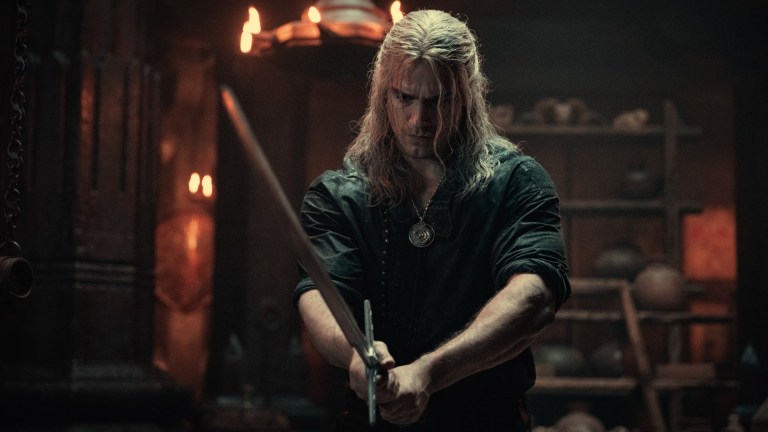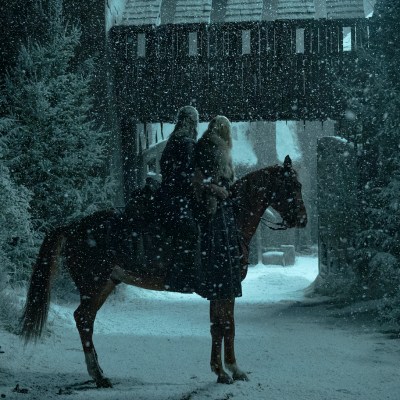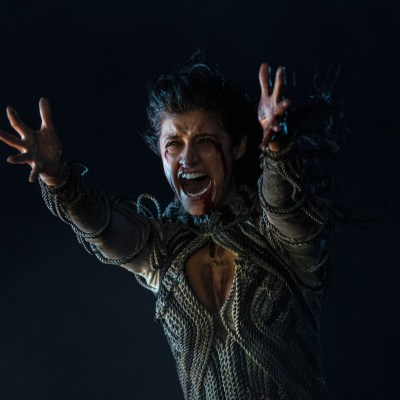The Witcher Season 2 Will Push the Boundaries of Fantasy TV
The cast and creator of The Witcher on how season two will explore new emotional depths.

Netflix’s The Witcher is one of the streamer’s most popular offerings, an epic fantasy teeming with magic, monsters, and complex characters with weighty, potentially world-saving destinies shared between them. Its first season featured thrilling fight sequences, a banger of a folk ballad about our titular monster-slaying hero, and a non-linear timeline that is occasionally as frustrating as it is fun to unravel. And though things will reportedly become a bit more chronological in the show’s second season, the interconnected stakes have never been higher for our favorite characters.
Emotional richness sets The Witcher apart from many of the other big-name fantasy properties that have come to our screens. At first glance, The Witcher seems like exactly the sort of show that gives fantasy a reputation for being exclusionary in its genre conventions: a pseudo-medieval setting full of dark creatures, hulking warriors, big swords, and a pretty blonde girl in distress. Yet, in actuality, The Witcher contains surprising multitudes: rich character arcs, dense internal mythology, complex politics, and a heartwarming found family at the core of its narrative–it just also happens to be set in a world populated by monsters.
Season one not only introduced mainstream viewers everywhere to Geralt of Rivia (Henry Cavill)–a magically enhanced monster hunter known as a Witcher–but also to the powerful sorceress Yennefer of Vengerberg (Anya Chalotra), and Cirilla (Freya Allan), the young princess of Cintra who secretly possesses powerful magic of her own. Though all are major players in Polish author Andrzej Sapkowski’s interconnected series of novels and short stories, they are not initially introduced with equal weight–a fact that showrunner Lauren Schmidt Hissrich was determined to change.
“In the books, Ciri and Yen are introduced through Geralt. We meet him first, we establish him first, we learn about his world [first],” Hissrich says. “And then these women kind of come in from the side. And no matter how strong they are, [they] still feel like secondary characters.”
Determined to “show all three were equally important,” Hissrich deliberately structured the first season of The Witcher to “change the lens with which we view these characters,” allowing all their stories to carry equal significance and weight. In doing so, her vision has not only helped make The Witcher more inclusive and fulfilling to watch as a singular TV show, it is redefining what sorts of stories we expect these big blockbuster fantasy series to be.
For example, what’s most interesting about Geralt isn’t his magical day job, but the way his character subverts common tropes about what a fantasy hero is supposed to be and do. On paper, it would be so easy to simply cast the show’s titular Witcher as a blunt, sword-wielding beefcake, an avatar of toxic masculinity, or some uncomfortable combination of both. Instead, both showrunner Hissrich and star Cavill have worked hard to craft a three-dimensional leading man with surprising, and often hidden, depths.
“That was a very important piece to me, that I represented that side of Geralt,” Cavill says. “At heart, he is a pure and good man who tries to do his best. I wanted to make sure that he came across as the wise man that he is. He’s not just a grunter.”
According to Hissrich, season two will show us Geralt’s “softer side,” though Cavill says that the new season will simply allow viewers to see the “layers” that were always present in his character.
“I would say we get to see more of his intellectual side, which was something I was keen to introduce,” he says. “Because season one was a particular choice–he was in the outside world and had a particular way of doing things. And [he] was without the luxury of opportunity for vast swathes of dialogue, which we often find in the books. I found it better to make him a listener and a watcher. Now that this second season has come around, he gets to be a bit more verbose.”
In season two, as the Witchers begin to come together, it’s not just Geralt whose full character comes to light.
As fans may have seen in the trailers, Geralt takes Ciri to the stronghold of Kaer Morhen in season two, where he and his mystical brethren trained in their youth. Cavill says he “really pushed” for the chance to portray the “softness” in the relationships between these men, who have shared so much in their lives together.
“It can be very easy to slide down the road of just a trope-y, stereotypically male figure,” Cavill explains. “But that’s not what Sapkowski wrote when it came to The Witcher. He wrote these intellectual, very caring, and, yes, very dangerous individuals. It’s not just ‘ugh, ugh, we kill stuff’ and ‘cold beer’ every time we talk.”
“He’s got a lot of soul,” Hissrich says, “And when he goes back with the people that he trusts most in the world, you get to see some of that vulnerability come out.”
But while season two will give us new perspectives on all of our favorite characters, it will also introduce some new ones along the way.
“Basically, we set the chessboard in season one,” Hissrich says. “In season two, the world is bigger. We are tracking a lot more groups of people this season. We have Geralt and Ciri and Yen, but we also have the elves and we’re sort of digging into their story.”
The second season is also primed to introduce multiple characters and realms that fans of the franchise have been clamoring for, including a certain master spy. “We meet Dijkstra and we get into Redania’s story and Philippa who everyone cannot wait to [finally] see,” Hissrich says. “You have mages. You have Nilfgaard. You have the rest of the Northern kingdoms. There are all these players on the board now.”
But, as many fans of The Witcher franchise are already aware, despite the increasingly complex political issues at work around the Continent, the biggest moments headed our way in the second season will be personal ones, as its three primary characters finally get to share a scene.
“The real payoff to this season is Geralt and Ciri and Yennefer coming together,” Hissrich says. “So much of The Witcher is about the relationship between these three characters. It’s the promise of the series: they’re going to come together as a family. It’s one of those moments that has such great [emotional] impact.”
In Hissrich’s mind, stories like The Witcher–sprawling, lore-rich fantasy series with a massive cast of characters–are “only interesting if you can dig in and care about a specific person or a specific relationship.”
“I spoke a lot about this when I was doing press for season one, but I wasn’t sure that I was fully qualified to [make The Witcher],” Hissrich says. “But when I dug into it and realized that this is a story about family, that is something I recognize and that I know how to do. I know how to do relationships.”
And that’s a good thing because after a season spent searching, Geralt and Ciri have finally found one another and will have to face the question: what’s next for them?
“We have this beautiful scene of them embracing at the end of season one; I found you, you found me. We are each other’s destiny, I will protect you and take care of you. We are now father and daughter. But that’s not how life works,” Hissrich says.
Because although Ciri is forever connected to Geralt through the Law of Surprise, the two don’t actually know each other. As Hissrich explains, “they’re essentially strangers” when season two begins, and a big part of their journey together will necessarily involve them learning to trust one another.
“You really get to see their relationship change,” Allan says. “Ciri has a lot of secrets to keep from him. She has gone through a lot, and she has a lack of trust in people. So it takes a while.”
According to Cavill, his character’s approach to building a genuine bond with Ciri is primarily about giving her the space and agency Ciri’s life has often lacked.
“It’s not that he doesn’t trust [her], it’s that he is watching and waiting for her to reveal herself to him,” Cavill explains. “She spent her last few months running from death–literally–and her home got burned to the ground and everyone she knew was killed. The last thing she needs is an inquisitor.”
Instead, Cavill “really wanted to portray” Geralt as someone who was, finally, “just allowing [Ciri] space to be.” But just because his intentions are good ones doesn’t mean their relationship is automatically smooth sailing.
“They have plenty of disagreements!” Allan laughs when asked about the evolution of their connection.
“But what I think makes the relationship eventually so strong, is that feuding that they have at the start. Ciri wants to be a great fighter and [Geralt]’s restricting that and [it’s] frustrating,” Allan says. “But obviously, it’s ultimately coming out of a place of care.”
In Hissrich’s view, Ciri and Geralt both have understandable reasons for their initial reactions to one another, which makes it even more necessary to show their bond evolving over time. “A really important [part] of the season is how their trust waxes and wanes. It’s not just an ‘Oh, something happens, and now we completely trust each other!’ thing. Because, again, life doesn’t work like that.”
The key to their relationship is that Geralt “finally shows her over a period of time that she can trust him and that he is someone she can rely on,” which, as Cavill points out, is not something that Ciri has had much of in her young life.
“Ultimately, they do become a real team because of what they go through together. And Ciri definitely gets to the point where Geralt is the person she trusts most in this world and they have a real love for each other,” Allan says. “It’s beautiful.”
Of course, Ciri isn’t the only major relationship in Geralt’s life, though she may be the most important one at the moment (if only because, as season two begins, he believes that his on-again, off-again love Yennefer is dead, having sacrificed herself to win the Battle of Sodden).
“Their relationship is complicated,” Chalotra laughs. “Again. Yet again. They’re both very independent people. And they don’t want to need each other. But they do.”
The fact that Yen begins the season on her own as a “prisoner of war” means that her story is initially going to look quite different from Ciri and Geralt’s. It will involve making “unlikely alliances” in order to survive, though Chalotra is coy about whom precisely those connections will be with.
“She has a lot to come to terms with this season,” Chalotra explains, “It changes her perspective and makes her grow.” Season two, to her, is “a more full exploration of this character and all the characters.”
But although we “go deeper” into Yennefer’s mind than ever before in season two, Chalotra says that what fans “will really relish” is her character’s upcoming meeting with Ciri.
“Their relationship is very exciting, and I’m really looking forward to seeing that dynamic play out,” Chalotra says. “From the books, we know how it ends up. But there’s a process to get there. And there are challenges they both face to get there.” Chalotra is effusive in her praise of Allen’s “nuanced” performance, declaring that “watching Ciri’s journey play out” was her “favorite thing about season two.”
Though the actress promises “tears and screams and many fights” in The Witcher’s second season, the heart of the show remains “the three core characters in this dysfunctional family that we have.” Which reinforces Hissrich’s assertion that season two is largely about what it means to be a family in the first place.
“What does it mean to be a family member to someone when you’re not related by blood? What does it mean to go back home? [These are themes] we play around with a lot,” Hissrich says. “And [also] what does it mean to forge forward and start a new branch in your life?”
These questions matter more than monsters or mages, but just because season two is about “really digging into these characters,” doesn’t mean this outing of The Witcher won’t have its share of thrilling twists.
“I want even the most diehard fans to be surprised by the moves our characters [make] this season,” Hissrich says.
“By how we take the book Blood of Elves and the tenets of that story and weave new stories into it. It’s more epic than ever.”
The Witcher Season Two premieres on Netflix on Dec. 17.



